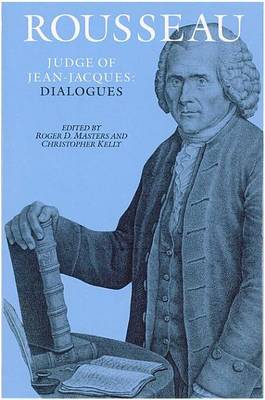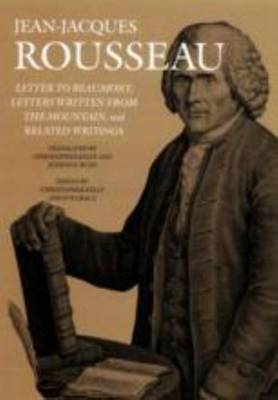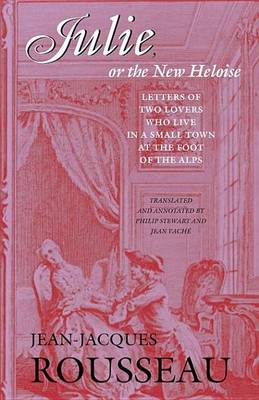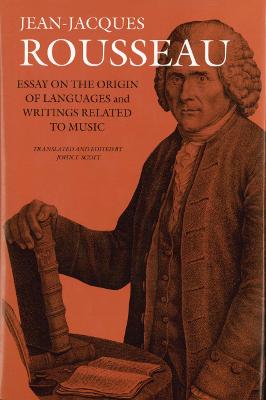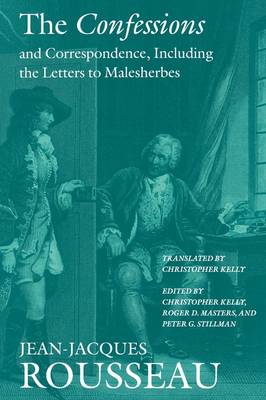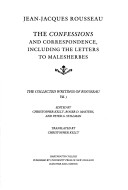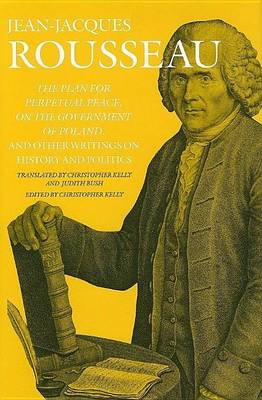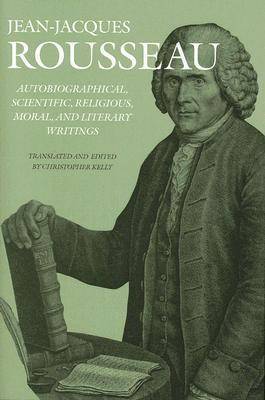Collected Writings of Rousseau
9 total works
Letter to Beaumont, Letters Written from the Mountain, and Related Writings
by Jean-Jacques Rousseau, Christopher Kelly, Eve Grace, and Judith R. Bush
The Letter to Beaumont is a response to a Pastoral Letter by Christophe de Beaumont, Archbishop of Paris (also included in this volume), which attacks the religious teaching in Emile. Rousseau's response concerns the general theme of the relation between reason and revelation and contains his most explicit and boldest discussions of the Christian doctrines of creation, miracles, and original sin.
In Letters Written from the Mountain, a response to the political crisis in Rousseau's homeland of Geneva caused by a dispute over the burning of his works, Rousseau extends his discussion of Christianity and shows how the political principles of the Social Contract can be applied to a concrete constitutional crisis. One of his most important statements on the relation between political philosophy and political practice, it is accompanied by a fragmentary"History of the Government of Geneva."
Finally,"Vision of Peter of the Mountain, Called the Seer" is a humorous response to a resident of Motiers who had been inciting attacks on Rousseau during his exile there. Taking the form of a scriptural account of a vision, it is one of the rare examples of satire from Rousseau's pen and the only work he published anonymously after his decision in the early 1750s to put his name on all his published works. Within its satirical form, the "Vision" contains Rousseau's last public reflections on religious issues.
Neither the Letter to Beaumont nor the Letters Written from the Mountain has been translated into English since defective translations that appeared shortly after their appearance in French. These are the first translations of both the "History" and the "Vision."
Discourse on the Sciences and Arts (First Discourse) and Polemics
by Jean-Jacques Rousseau
Rousseau's great epistolary novel, Julie, or the New Heloise, has been virtually unavailable in English since 1810. In it, Rousseau reconceptualized the relationship of the individual to the collective and articulated a new moral paradigm. The story follows the fates and smoldering passions of Julie d'Etange and St. Preux, a one-time lover who re-enters Julie's life at the invitation of her unsuspecting husband, M. de Wolmar.
The complex tones of this work made it a commercial success and a continental sensation when it first appeared in 1761, and its embodiment of Rousseau's system of thought, in which feelings and intellect are intertwined, redefined the function and form of fiction for decades. As the characters negotiate a complex maze of passion and virtue, their purity of soul and honest morality reveal, as Rousseau writes in his preface,"the subtleties of heart of which this work is full."
A comprehensive introduction and careful annotations make this novel accessible to contemporary readers, both as an embodiment of Rousseau's philosophy and as a portrayal of the tension and power inherent in domestic life.
Essay on the Origin of Languages and Writings Related to Music
by Jean-Jacques Rousseau and John T. Scott
This graceful translation remedies both those failings by bringing together the Essay, which John T. Scott says"most clearly displays the juncture between Rousseau's musical theory and his major philosophical works," with a comprehensive selection of the musical writings. Many of the latter are responses to authors like Rameau, Grimm, and Raynal, and a unique feature of this edition is the inclusion of writings by these authors to help establish the historical and ideological contexts of Rousseau's writings and the intellectual exchanges of which they are a part.
With an introduction that provides historical background, traces the development of Rousseau's musical theory, and shows that these writings are not an isolated part of his oeuvre but instead are animated by the same"system," this volume fashions a much-needed portal through which literary scholars, musicologists, historians, and political theorists can enter into an important but hitherto overlooked chamber of Rousseau's vast intellectual palace.
The Confessions and Correspondence, Including the Letters to Malesherbes
by Jean-Jacques Rousseau, Christopher Kelly, Roger D. Masters, and Peter G. Stillman
Based on his doctrine of natural goodness, Rousseau intended the Confessions as a testing ground to explore his belief that, as Christopher Kelly writes,"people are to be measured by the depth and nature of their feelings." Re-created here in a meticulously documented new translation based on the definitive Pleiade edition, the work represents Rousseau's attempt to forge connections among his beliefs, his feelings, and his life. More than a "behind-the-scenes look at the private life of a public man," Kelly writes, "the Confessions is at the center of Rousseau's philosophical enterprise."
v. 12
Autobiographical, Scientific, Religious, Moral, and Literary Writings
by Jean-Jacques Rousseau
He also ponders the possibilities for and consequences of air travel in "The New Daedalus."
